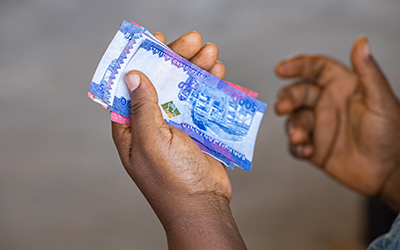Blog
From Monterrey to Addis Ababa, and what has happened since?
The importance of domestic revenue mobilization and taxation for sustainable development is widely acknowledged in global development discussions, but for real change to happen the amounts of development aid and political engagement need to live up to commitments.
Key factors of development, including the provision of crucial public services such as education, healthcare, and infrastructure, can only be pursued at scale if states have sufficient resources to spend. Countries in the Global South have made great strides to increase their tax revenues in the last decades, but overall revenues remain low compared to advanced economies both in absolute and relative terms.
Recent shocks — the COVID-19 pandemic and the war in Ukraine — have caused serious difficulties to the domestic revenue mobilization (DRM) efforts in developing countries. Currently around 60 percent of the world’s poorest countries are in debt distress or at high risk of it. This means that these countries use hard earned and sparse tax revenues to pay interests on their loans.
Support does not live up to commitments
 For the domestic efforts to collect revenues to pick up in a productive manner it is critical that developing countries are strongly supported and strengthened through global initiatives, both private and public. What is needed is both scaled up foreign direct investment (FDI) and development aid to strengthen the development process. However, the amounts of official development assistance (ODA) continue to fail to live up to commitments. This is critical because, in the current situation, it is impossible for low-income countries to build up sustainable taxation and expenditure systems on their own.
For the domestic efforts to collect revenues to pick up in a productive manner it is critical that developing countries are strongly supported and strengthened through global initiatives, both private and public. What is needed is both scaled up foreign direct investment (FDI) and development aid to strengthen the development process. However, the amounts of official development assistance (ODA) continue to fail to live up to commitments. This is critical because, in the current situation, it is impossible for low-income countries to build up sustainable taxation and expenditure systems on their own.
What is likewise missing is a coordinated effort towards addressing the different Sustainable Development Goals. Recent interest in environmental matters, climate change mitigation, and the green agenda is not only welcome, it is indispensable. At the same time, it looks as if the rise of climate finance is crowding out development finance to combat poverty. Additionality is needed —not crowding out. Synergies can and must be found, with so called blue and green bonds being one example.
International stepping stones
International cooperation on taxation is crucial, and an important stepping stone was put in place in 2002, when the first International Conference on Financing for Development took place in Monterrey, Mexico. Similarly, fiscal discussions were at the core of debates in Addis Ababa, Ethiopia in July 2015. The conference saw the birth of the Addis Ababa Action Agenda, a global framework for financing sustainable development, and the Addis Tax Initiative (ATI).
 The ATI brought together 70 partner countries to ‘promote fair and effective domestic revenue mobilization, policy coherence and the social contract through partnerships and knowledge building’. In 2020, the ATI group published the ATI Declaration 2025, including a commitment to maintain or surpass the 2020 global target level of 441.1 million dollars of DRM cooperation for country-owned tax reforms.
The ATI brought together 70 partner countries to ‘promote fair and effective domestic revenue mobilization, policy coherence and the social contract through partnerships and knowledge building’. In 2020, the ATI group published the ATI Declaration 2025, including a commitment to maintain or surpass the 2020 global target level of 441.1 million dollars of DRM cooperation for country-owned tax reforms.
Illicit financial flows – a severe loss for many
Global collaboration is also important when it comes to combatting illicit financial flows. Important steps have been taken. In 2013, OECD and the G20 countries adopted a Framework on Base Erosion and Profit Shifting. 2021 saw a ground breaking tax deal when, under the framework, 136 countries agreed to global tax reforms. Of importance for global financial flows was the commitment to a 15 percent global minimum corporate tax, which should, in principle, limit incentives for profit shifting.
 But bringing this to life in practice is easier said than done. To date the tax deal is lacking in implementation, as it is being blocked by Hungary in the EU and by the Congress in the USA. Meanwhile the amount of money lost to tax havens keeps growing. A recent WIDER Working Paper indicates a remarkable increase in profit shifting between 1975-2019, i.e. even after major policy initiatives were announced. Globally, ten percent of corporate tax revenues are lost as a result, reflecting that the ’bucket’ is leaking when it comes to mobilization of funds for developing countries.
But bringing this to life in practice is easier said than done. To date the tax deal is lacking in implementation, as it is being blocked by Hungary in the EU and by the Congress in the USA. Meanwhile the amount of money lost to tax havens keeps growing. A recent WIDER Working Paper indicates a remarkable increase in profit shifting between 1975-2019, i.e. even after major policy initiatives were announced. Globally, ten percent of corporate tax revenues are lost as a result, reflecting that the ’bucket’ is leaking when it comes to mobilization of funds for developing countries.
Looking ahead
When looking ahead regarding the global tax agenda, glimpses of hope can be seen. The problems encountered for the OECD-based global tax forum have been evident to many. And now it looks like these observations, most strongly articulated by African nations, are being widely heard. A new UN resolution, approved by the member states, will help bring the global discourse on tax rules to the UN table. This hopefully means that going forward developing nations will have a greater say over these issues.
While the impact of this shift is uncertain, already now these proceedings contain good news on three different levels. They indicate, first, that domestic revenue mobilization and taxation are gaining prominence on the global agenda. Second, the process reveals that African countries are getting an independent and welcome voice that must be heard in global arenas. Third, is the general acknowledgment of failure so far to spur concrete action, which points to a genuine interest in curbing global profit shifting. With about one trillion dollars of multinational profits shifted to tax havens annually, this should be motivating action by all.
The views expressed in this piece are those of the authors, and do not necessarily reflect the views of the Institute or the United Nations University, nor the programme/project donors.
 Join the network
Join the network






